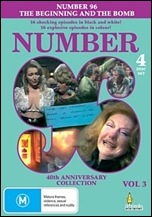 On Tuesday, 13 March at 8.30pm, it will be 40 years exactly since ‘Australian television lost its virginity’ with the premiere of what would become the mother of all soaps – Number 96. It was a series that was unashamedly ‘adults only’ and would give a never-before-seen glimpse at life in suburban Sydney, based around the tenants within a fictional apartment block.
On Tuesday, 13 March at 8.30pm, it will be 40 years exactly since ‘Australian television lost its virginity’ with the premiere of what would become the mother of all soaps – Number 96. It was a series that was unashamedly ‘adults only’ and would give a never-before-seen glimpse at life in suburban Sydney, based around the tenants within a fictional apartment block.
The 40th anniversary of the series’ debut is being commemorated by another DVD release – this time containing 16 of the show’s early black-and-white episodes (only around 20 black-and-white episodes are still intact in the archive, the remaining 500+ episodes are destroyed or, at best, unaccounted for) plus a sequence of 16 episodes surrounding the show’s infamous bomb-blast cliff-hanger of September 1975.
 To coincide with the 40th anniversary and the DVD launch, here’s a look back to August 1974, when Woman’s Day magazine compiled a special 24-page dossier – Number 96 Confidential – on Australia’s most-watched TV drama, with the show’s creator and head writer David Sale and several of the main characters and actors offering their own insight on the lives depicted on the show that changed the course of Australian television drama.
To coincide with the 40th anniversary and the DVD launch, here’s a look back to August 1974, when Woman’s Day magazine compiled a special 24-page dossier – Number 96 Confidential – on Australia’s most-watched TV drama, with the show’s creator and head writer David Sale and several of the main characters and actors offering their own insight on the lives depicted on the show that changed the course of Australian television drama.
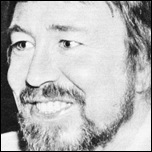 David Sale (pictured) said that despite its reputation Number 96 is not a “sex and sin show”. “I would describe it as a ‘gurgle giggle’ show, myself,” he told Woman’s Day. “I think the main reason people watch 96 is its humour. About 80 per cent of the show is fun. People want to laugh.” Sale also wanted to depict a cross-section of the Australian community. “I had a couple of migrants, the Sutcliffes, and Aldo, who’s a migrant, and his wife. And I wanted to put in a couple of homosexuals. But I did want to get away from the concept of homosexuals being all flapping and effeminacy – the homosexuals in 96 are nice people. They don’t wear eye-shadow, carry handbags, or hang about public toilets. I do think the characters of Don (Joe Hasham) and Dudley (Chard Hayward) have done more to put homosexuals in some sort of reasonable light than the whole of the Gay Lib movement.” Sale also highlighted that as well as breaking down cultural barriers, such as racial or sexual, the show also highlighted various social issues to the audience. “Lucy (Elisabeth Kirkby) had a lump on her breast. We were pushing the message that women must go to their doctors for yearly cancer checkups.” In another storyline, a character ended up addicted to LSD. “I met two men and their wives at a party soon after that, and they said they were fans of Number 96. It turned out they were Vice Squad detectives and the both said they’d never stop their daughters from watching 96. One of them said that his daughter learnt a lot about the result of drug-taking and promiscuity – and he’d much rather she learnt that way, second-hand, than she went out and tried it for herself.”
David Sale (pictured) said that despite its reputation Number 96 is not a “sex and sin show”. “I would describe it as a ‘gurgle giggle’ show, myself,” he told Woman’s Day. “I think the main reason people watch 96 is its humour. About 80 per cent of the show is fun. People want to laugh.” Sale also wanted to depict a cross-section of the Australian community. “I had a couple of migrants, the Sutcliffes, and Aldo, who’s a migrant, and his wife. And I wanted to put in a couple of homosexuals. But I did want to get away from the concept of homosexuals being all flapping and effeminacy – the homosexuals in 96 are nice people. They don’t wear eye-shadow, carry handbags, or hang about public toilets. I do think the characters of Don (Joe Hasham) and Dudley (Chard Hayward) have done more to put homosexuals in some sort of reasonable light than the whole of the Gay Lib movement.” Sale also highlighted that as well as breaking down cultural barriers, such as racial or sexual, the show also highlighted various social issues to the audience. “Lucy (Elisabeth Kirkby) had a lump on her breast. We were pushing the message that women must go to their doctors for yearly cancer checkups.” In another storyline, a character ended up addicted to LSD. “I met two men and their wives at a party soon after that, and they said they were fans of Number 96. It turned out they were Vice Squad detectives and the both said they’d never stop their daughters from watching 96. One of them said that his daughter learnt a lot about the result of drug-taking and promiscuity – and he’d much rather she learnt that way, second-hand, than she went out and tried it for herself.”
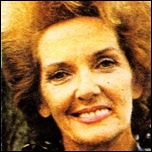 On to the show’s characters, starting with Pat McDonald talking about her character, Dorrie Evans who is married to husband Herb (Ron Shand) and becomes known for her various malapropisms: “Herb and Dorrie owned a little house which they sold to the company of high-rise developers, with the proviso of a life tenancy in the block of flats they planned to erect there. As such Dorrie decided she was a cut above the normal, so she took on the honorary capacity of “conserge”, and as soon as they’d settled in began her “consergical” duties – which is where the peeking through keyholes ideas came from. Her other great interest is “pornograffy”, as she has become vice-president of the Purity League and feels it necessary to watch the late movies on television and examine newspapers and magazines for any sign of moral decay. She feels “pornograffy” is everywhere… and asks herself, ‘where will this all end?’.”
On to the show’s characters, starting with Pat McDonald talking about her character, Dorrie Evans who is married to husband Herb (Ron Shand) and becomes known for her various malapropisms: “Herb and Dorrie owned a little house which they sold to the company of high-rise developers, with the proviso of a life tenancy in the block of flats they planned to erect there. As such Dorrie decided she was a cut above the normal, so she took on the honorary capacity of “conserge”, and as soon as they’d settled in began her “consergical” duties – which is where the peeking through keyholes ideas came from. Her other great interest is “pornograffy”, as she has become vice-president of the Purity League and feels it necessary to watch the late movies on television and examine newspapers and magazines for any sign of moral decay. She feels “pornograffy” is everywhere… and asks herself, ‘where will this all end?’.”
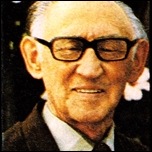 Herb Evans: “Dorrie and I met at a fireworks display at Circular Quay on a New Year’s Eve. I can’t remember when it was, but we had our Jubilee Wedding in December 1973 … Our niece Georgina (Susannah Piggott) came to stay with us. When we heard she was coming we expected a demure little girl and there came this one, all daggy with beads and blue jeans, and a see-through shirt… and another day I was shaving and she came into the bathroom and dropped her dressing gown, and she had nothing on underneath, and she stepped into the shower, cool as you please. I never knew where to look … I’m used to Dorrie, but sometimes she makes things a bit hard. She tries to run everyone’s lives. Her stock line is “Why wasn’t I told?” and of course most of the time she hears everything anyway, sooner or later.”
Herb Evans: “Dorrie and I met at a fireworks display at Circular Quay on a New Year’s Eve. I can’t remember when it was, but we had our Jubilee Wedding in December 1973 … Our niece Georgina (Susannah Piggott) came to stay with us. When we heard she was coming we expected a demure little girl and there came this one, all daggy with beads and blue jeans, and a see-through shirt… and another day I was shaving and she came into the bathroom and dropped her dressing gown, and she had nothing on underneath, and she stepped into the shower, cool as you please. I never knew where to look … I’m used to Dorrie, but sometimes she makes things a bit hard. She tries to run everyone’s lives. Her stock line is “Why wasn’t I told?” and of course most of the time she hears everything anyway, sooner or later.”
 Flo Patterson (Bunney Brooke): “I used to live in a little house on Paradise Street, but it burnt down and all I had in the world was Mr Perky, my budgerigar, and my dressing-gown. I didn’t have anywhere to go. Dorrie and I have been friends for years, so she and Herb took me in. I get a bit lonely sometimes. But then I think, well, I’ve got two beaut friends and I’ve got Mr Perky… the cat got burnt when the house burnt down. Dorrie threw the ashes out and she put garlic salt into the urn, hoping I wouldn’t notice, but I did. She didn’t throw him out on purpose.”
Flo Patterson (Bunney Brooke): “I used to live in a little house on Paradise Street, but it burnt down and all I had in the world was Mr Perky, my budgerigar, and my dressing-gown. I didn’t have anywhere to go. Dorrie and I have been friends for years, so she and Herb took me in. I get a bit lonely sometimes. But then I think, well, I’ve got two beaut friends and I’ve got Mr Perky… the cat got burnt when the house burnt down. Dorrie threw the ashes out and she put garlic salt into the urn, hoping I wouldn’t notice, but I did. She didn’t throw him out on purpose.”
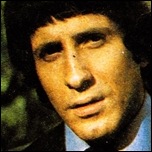 Joe Hasham (on character Don Finlayson): “He originally came from the country. He came to the big smoke, and being a rather brilliant scholar, he studied law – and was considered one of the brilliant young lawyers of the time. The most shattering thing in his life apart from losing his parents (they were killed in a plane crash) was emotionally losing his friend Bruce Taylor (Paul Weingott) who was living with him at 96 and at the same time having a mad affair with Maggie Cameron (Bettina Welch). That ended in disaster and Bruce left. Don was very hurt. He did have problems with his homosexuality before he came to terms with himself, after having many encounters with many ladies. He’s slept with them, but he’s never made love to them. He’s not a wanton tart. He’s a very decent sort of human being. He’s just like anybody else. He just happens to be camp.”
Joe Hasham (on character Don Finlayson): “He originally came from the country. He came to the big smoke, and being a rather brilliant scholar, he studied law – and was considered one of the brilliant young lawyers of the time. The most shattering thing in his life apart from losing his parents (they were killed in a plane crash) was emotionally losing his friend Bruce Taylor (Paul Weingott) who was living with him at 96 and at the same time having a mad affair with Maggie Cameron (Bettina Welch). That ended in disaster and Bruce left. Don was very hurt. He did have problems with his homosexuality before he came to terms with himself, after having many encounters with many ladies. He’s slept with them, but he’s never made love to them. He’s not a wanton tart. He’s a very decent sort of human being. He’s just like anybody else. He just happens to be camp.”
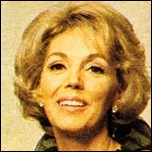 Carol Raye (on character Amanda von Pappenburg): “Amanda is Don’s aunt. She hadn’t seen Don since he was a young boy. She’s an Aussie but she left Australia when she was very young, and married three millionaires – all of whom died. The last one, Max, was titled, so she’s now a Baroness. She’s a complete extrovert, and completely shockproof. Nothing shocks her – homosexuality, love affairs, anything. As with Flo, of whom she is very fond – she has no comprehension of class distinctions. Then Max’s money comes through and she inherits $20 million. So she disperses a lot of largesse around Number 96, pays all Don’s debts and flies off to Europe.”
Carol Raye (on character Amanda von Pappenburg): “Amanda is Don’s aunt. She hadn’t seen Don since he was a young boy. She’s an Aussie but she left Australia when she was very young, and married three millionaires – all of whom died. The last one, Max, was titled, so she’s now a Baroness. She’s a complete extrovert, and completely shockproof. Nothing shocks her – homosexuality, love affairs, anything. As with Flo, of whom she is very fond – she has no comprehension of class distinctions. Then Max’s money comes through and she inherits $20 million. So she disperses a lot of largesse around Number 96, pays all Don’s debts and flies off to Europe.”

 Johnny Lockwood (on Aldo Godolfus): “Aldo is a Hungarian, who escaped from Hungary in 1956, and has a daughter, Rose (Vivienne Garrett), who is about 19 or 20. His wife was supposed to have died not long after he got here. Aldo has worked very hard and has managed to buy the delicatessen which he runs with his daughter. His ambition in life is to own his own restaurant, and for a long time his main topic of conversation is this dream.”
Johnny Lockwood (on Aldo Godolfus): “Aldo is a Hungarian, who escaped from Hungary in 1956, and has a daughter, Rose (Vivienne Garrett), who is about 19 or 20. His wife was supposed to have died not long after he got here. Aldo has worked very hard and has managed to buy the delicatessen which he runs with his daughter. His ambition in life is to own his own restaurant, and for a long time his main topic of conversation is this dream.”
 Philippa Baker (on Roma Godolfus nee Lubinski): “She was born in Russia and had been going out with Yuri (Lubinski) before the war. All of her family, and presumably herself, were in a concentration camp. She managed to escape and in some way Yuri and she found each other again and got married. Yuri was a qualified architect in Russia, which meant he couldn’t get a job here because his qualifications were not recognised. So they started a restaurant – a kosher restaurant. Then Yuri died and Roma decided to sell the restaurant. So this awfully nice Hungarian Jewish gentleman called Aldo Godolfus came to see Roma because he wanted to buy it. But he lost his deposit so she sold the restaurant to somebody else (but) they felt immediate rapport. Roma had been trying to nudge Aldo into proposing, using all the wiles she could think of, and still he said nothing. So Roma proposed to him. They had a lovely wedding. No, they didn’t. They ran away to Surfers Paradise and nobody knew they got married, so it wasn’t so lovely.”
Philippa Baker (on Roma Godolfus nee Lubinski): “She was born in Russia and had been going out with Yuri (Lubinski) before the war. All of her family, and presumably herself, were in a concentration camp. She managed to escape and in some way Yuri and she found each other again and got married. Yuri was a qualified architect in Russia, which meant he couldn’t get a job here because his qualifications were not recognised. So they started a restaurant – a kosher restaurant. Then Yuri died and Roma decided to sell the restaurant. So this awfully nice Hungarian Jewish gentleman called Aldo Godolfus came to see Roma because he wanted to buy it. But he lost his deposit so she sold the restaurant to somebody else (but) they felt immediate rapport. Roma had been trying to nudge Aldo into proposing, using all the wiles she could think of, and still he said nothing. So Roma proposed to him. They had a lovely wedding. No, they didn’t. They ran away to Surfers Paradise and nobody knew they got married, so it wasn’t so lovely.”
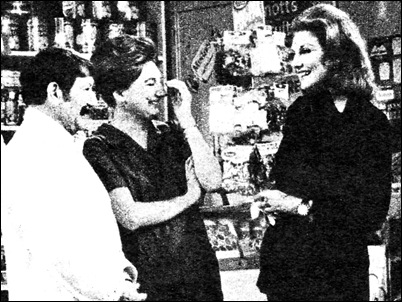
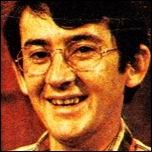 Arnold Feather (Jeff Kevin): “I studied at night school and worked during the day at Mrs Lubinski’s restaurant, where I met the people from Number 96. Then I moved in, and lived with the Sutcliffes. There have been great traumas. The first was with Georgina Carter, Mrs Evans’ niece. She was my first romance. She was a virgin and was quite keen on her virginity being taken. We kept trying, but we were always being caught. My next great love affair was with Robyn Ross. I was desperately in love with her. I even went so far as to buy her an engagement ring. But then I was most mortified and shocked and horrified to find out “she” was a drag queen (Carlotta), and I swore off women for some time after that.”
Arnold Feather (Jeff Kevin): “I studied at night school and worked during the day at Mrs Lubinski’s restaurant, where I met the people from Number 96. Then I moved in, and lived with the Sutcliffes. There have been great traumas. The first was with Georgina Carter, Mrs Evans’ niece. She was my first romance. She was a virgin and was quite keen on her virginity being taken. We kept trying, but we were always being caught. My next great love affair was with Robyn Ross. I was desperately in love with her. I even went so far as to buy her an engagement ring. But then I was most mortified and shocked and horrified to find out “she” was a drag queen (Carlotta), and I swore off women for some time after that.”
 Norma Whittaker (Sheila Kennelly): “We’d had a bit of strife at Toorak, because (husband) Les had some chook dung delivered to the place and the other people got upset about that. So we moved to Sydney, to Number 96, and Les gets a job as a wardsman at the hospital and I get a job in the pub near 96. We found the flat before we got the jobs… we met this rude old sticky-beak Dorrie Evans, puttin’ on airs and graces all the time. Our Gary’s in the army. He came to live with us with his wife. He married this “Eyetalian” girl he met overseas. She drank coffee for breakfast and kept cooking all this peculiar “Eyetalian” food with that garlic stuff in it… funny ways, the “Eyetalians” have…. Jack Sellars decided to open this wine bar. Then this bloke came into the hotel and he took a bit of a shine to me. He was an artist and he liked large ladies. Said he wanted to paint a picture of me. So I got all dressed up in me black dress and me pearls and he painted this picture. We had this big unveiling in the pub – and there I am, large as life – and the ruddy thing’s starkers! Jack loved that painting and he put it in the wine bar. I’m working there and there’s this ruddy great nude piccie up there for always!”
Norma Whittaker (Sheila Kennelly): “We’d had a bit of strife at Toorak, because (husband) Les had some chook dung delivered to the place and the other people got upset about that. So we moved to Sydney, to Number 96, and Les gets a job as a wardsman at the hospital and I get a job in the pub near 96. We found the flat before we got the jobs… we met this rude old sticky-beak Dorrie Evans, puttin’ on airs and graces all the time. Our Gary’s in the army. He came to live with us with his wife. He married this “Eyetalian” girl he met overseas. She drank coffee for breakfast and kept cooking all this peculiar “Eyetalian” food with that garlic stuff in it… funny ways, the “Eyetalians” have…. Jack Sellars decided to open this wine bar. Then this bloke came into the hotel and he took a bit of a shine to me. He was an artist and he liked large ladies. Said he wanted to paint a picture of me. So I got all dressed up in me black dress and me pearls and he painted this picture. We had this big unveiling in the pub – and there I am, large as life – and the ruddy thing’s starkers! Jack loved that painting and he put it in the wine bar. I’m working there and there’s this ruddy great nude piccie up there for always!”
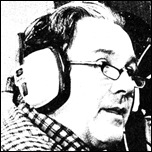 Les Whittaker (Gordon McDougall): “Of course I’ve always been keen on inventions and improving my mind. I have many butterflies inside my head but they never seem to settle long enough in one place to sip the nectar of success. Being a hospital wardsman I first thought I would improve the ambulance service in Paddington, so I invented the Whittaker Radio Controlled Ambulance. I tried to build a ham radio, which Dorrie called my Devon Ham Radio. Unfortunately the first day she came to the door when we’d moved in, I opened the door and the radio set exploded and blew the two of us across the hall. I did have one successful invention. I invented the Whittaker Wine-o-meter. It worked in the wine bar for ages. Then I went on an inventors’ program on a local television channel, and a gentleman in Melbourne took up my invention and started to manufacture it. But unfortunately I didn’t read the small print of the contract and we found out later that he would have to sell two million units before I would make anything out of it. So if Les Whittaker lives to mid-2048 we might begin to get some royalties!”
Les Whittaker (Gordon McDougall): “Of course I’ve always been keen on inventions and improving my mind. I have many butterflies inside my head but they never seem to settle long enough in one place to sip the nectar of success. Being a hospital wardsman I first thought I would improve the ambulance service in Paddington, so I invented the Whittaker Radio Controlled Ambulance. I tried to build a ham radio, which Dorrie called my Devon Ham Radio. Unfortunately the first day she came to the door when we’d moved in, I opened the door and the radio set exploded and blew the two of us across the hall. I did have one successful invention. I invented the Whittaker Wine-o-meter. It worked in the wine bar for ages. Then I went on an inventors’ program on a local television channel, and a gentleman in Melbourne took up my invention and started to manufacture it. But unfortunately I didn’t read the small print of the contract and we found out later that he would have to sell two million units before I would make anything out of it. So if Les Whittaker lives to mid-2048 we might begin to get some royalties!”
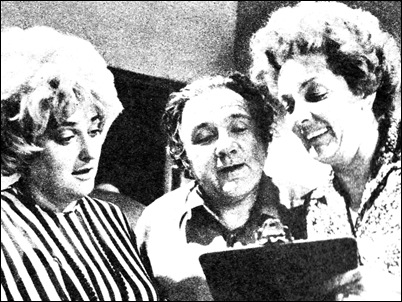
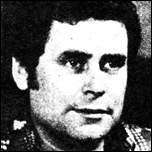 Tom Oliver (on Jack Sellars): “Jack’s an SP bookie when he first comes in. A very rough diamond, with a heart of gold. He’d chop off his right arm to help people. He’s out to improve himself. He made money on houses, went into property. He bought Number 96. He has improved himself, his manner, dress, habits. He’s very faithful to one woman – while she’s there. When the chemist’s husband was killed he bought the lease of the chemist shop, and decided to turn it into a wine bar, which he did, and called it Norma’s Bar. Norma and Les Whittaker manage it for him.”
Tom Oliver (on Jack Sellars): “Jack’s an SP bookie when he first comes in. A very rough diamond, with a heart of gold. He’d chop off his right arm to help people. He’s out to improve himself. He made money on houses, went into property. He bought Number 96. He has improved himself, his manner, dress, habits. He’s very faithful to one woman – while she’s there. When the chemist’s husband was killed he bought the lease of the chemist shop, and decided to turn it into a wine bar, which he did, and called it Norma’s Bar. Norma and Les Whittaker manage it for him.”
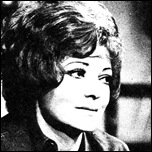 Elaine Lee (on Vera Collins): “She’s been a prostitute. She was raped by her stepfather in South Africa. She managed to save her money and got herself to Sydney. She had no job. I don’t see her as a standing-on-the-street sort of lady. I think she went out with men, and they probably bought her dinner and paid her rent for a week or so. She’s not a tart. I think she fell on hard times and some rich guys paid the rent every so often. She dabbled in dress designing and was discovered by Maggie Cameron and set up in a shop. That blew up over a young man who Vera wasn’t interested in but Maggie was. Vera had married Harry Collins (Norman Yemm), and they’d been divorced. On two occasions she took him back. The first time he nearly raped her, and they set up house again, but that broke up. The second time he was just insanely jealous, and kept imagining she was involved with all sorts of men, so that broke up too.”
Elaine Lee (on Vera Collins): “She’s been a prostitute. She was raped by her stepfather in South Africa. She managed to save her money and got herself to Sydney. She had no job. I don’t see her as a standing-on-the-street sort of lady. I think she went out with men, and they probably bought her dinner and paid her rent for a week or so. She’s not a tart. I think she fell on hard times and some rich guys paid the rent every so often. She dabbled in dress designing and was discovered by Maggie Cameron and set up in a shop. That blew up over a young man who Vera wasn’t interested in but Maggie was. Vera had married Harry Collins (Norman Yemm), and they’d been divorced. On two occasions she took him back. The first time he nearly raped her, and they set up house again, but that broke up. The second time he was just insanely jealous, and kept imagining she was involved with all sorts of men, so that broke up too.”
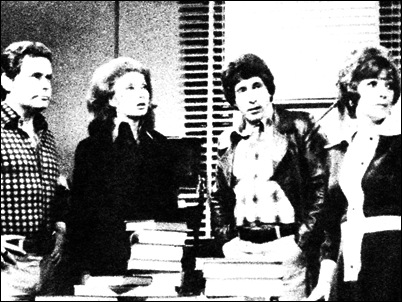
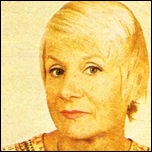 Elisabeth Kirkby (on Lucy Sutcliffe): “Lucy comes from Salford in Lancashire and has been married to Alf since the war, when he was serving in the British Army. Alf is the classic example of the complaining, whingeing Pom and his whole aim was to get back to England. Then Lucy became ill. She knew she had a lump on her breast but she was too scared to see a doctor because she thought she had cancer and she knew that without her salary they would have no breadwinner. She was terrified because she thought she’d have to undergo a radical mastectomy, she’d be deformed, to a degree, that her husband would think it was horrible…”
Elisabeth Kirkby (on Lucy Sutcliffe): “Lucy comes from Salford in Lancashire and has been married to Alf since the war, when he was serving in the British Army. Alf is the classic example of the complaining, whingeing Pom and his whole aim was to get back to England. Then Lucy became ill. She knew she had a lump on her breast but she was too scared to see a doctor because she thought she had cancer and she knew that without her salary they would have no breadwinner. She was terrified because she thought she’d have to undergo a radical mastectomy, she’d be deformed, to a degree, that her husband would think it was horrible…”
 James Elliott (on Alf Sutcliffe): “Basically Alf if a bit of a rough nut – he’s a knockabout sort of character, not very respectful to his superiors, super self-confident with people he knows. He had a working class background, he came from Salford, near Manchester. He met and married Lucy during the war. Alf is very affectionate towards Lucy, and he loves her very much, although his rough-nut mannerisms might indicate to the contrary. He’s almost very solidly working-class in his contempt for people of a different class. In fact he’s very class conscious. He’s a hard worker but he’s not consistent. Lucy runs a laundrette. She’s more consistently employed than Alf. Alf is continually contemptuous of Australia but secretly he probably loves it here. When he went back to England he found his friends there had grown away from him. and he’d grown away from them, whereas in Australia he’s grown to love and like the people at 96. He knows inwardly he’d be out of his depth back in England, but he still loves to sling off at Australia, usually in a way that’s not logically balanced… Alf’s arguments aren’t usually balanced.”
James Elliott (on Alf Sutcliffe): “Basically Alf if a bit of a rough nut – he’s a knockabout sort of character, not very respectful to his superiors, super self-confident with people he knows. He had a working class background, he came from Salford, near Manchester. He met and married Lucy during the war. Alf is very affectionate towards Lucy, and he loves her very much, although his rough-nut mannerisms might indicate to the contrary. He’s almost very solidly working-class in his contempt for people of a different class. In fact he’s very class conscious. He’s a hard worker but he’s not consistent. Lucy runs a laundrette. She’s more consistently employed than Alf. Alf is continually contemptuous of Australia but secretly he probably loves it here. When he went back to England he found his friends there had grown away from him. and he’d grown away from them, whereas in Australia he’s grown to love and like the people at 96. He knows inwardly he’d be out of his depth back in England, but he still loves to sling off at Australia, usually in a way that’s not logically balanced… Alf’s arguments aren’t usually balanced.”
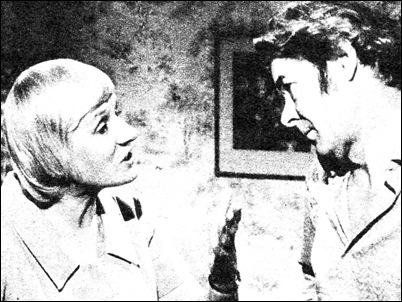
Although only some cast members of the time are profiled in the Woman’s Day special – others that appeared at that stage of the series included Chard Hayward, Mike Dorsey, Wendy Blacklock, Frances Hargreaves, Josephine Knur, Pamela Garrick and Bettina Welch – more than one thousand actors and six thousand extras appeared in the series over its six year run of 1218 episodes.
There have also been three earlier DVD releases of Number 96. In 2006, to coincide with the 50th year of Australian television, the 1973 movie version and the 1976 special They Said It Wouldn’t Last (which commemorated the show’s 1000th episode) were released on DVD. This was followed in 2008 by the release of 32 episodes surrounding the ongoing mystery of the ‘pantyhose strangler’ (pictured) who claimed the lives of a number of characters – and then in 2010 the subsequent batch of 32 episodes after the identity of the murderer was revealed.
Number 96: The Beginning And The Bomb is released by Umbrella Entertainment.
Source: Woman’s Day, 12 August 1974. TV Week, 13 August 1977.
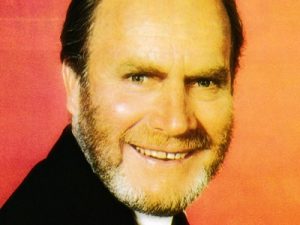
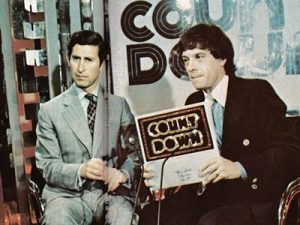
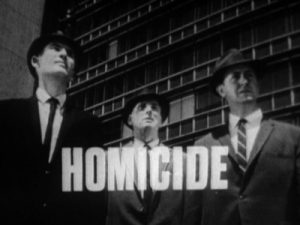
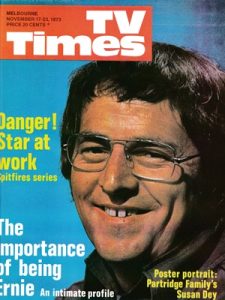
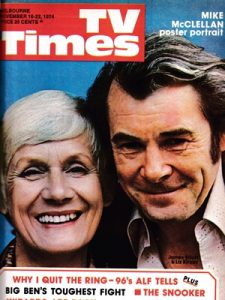
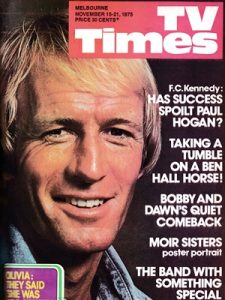
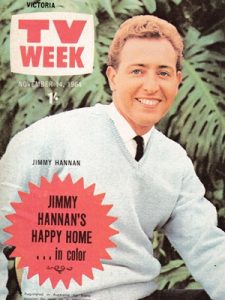
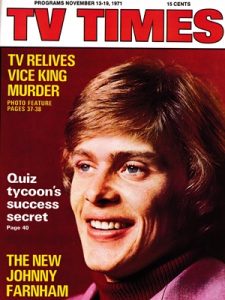
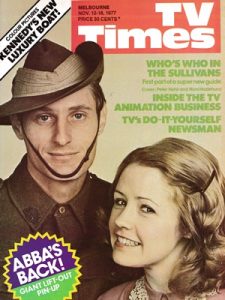
I had forgotten so much of the detail. Well, perhaps I didn't learn too much detail as I peeked through the crack in the slightly opened door, or when I needed frequent glasses of water.